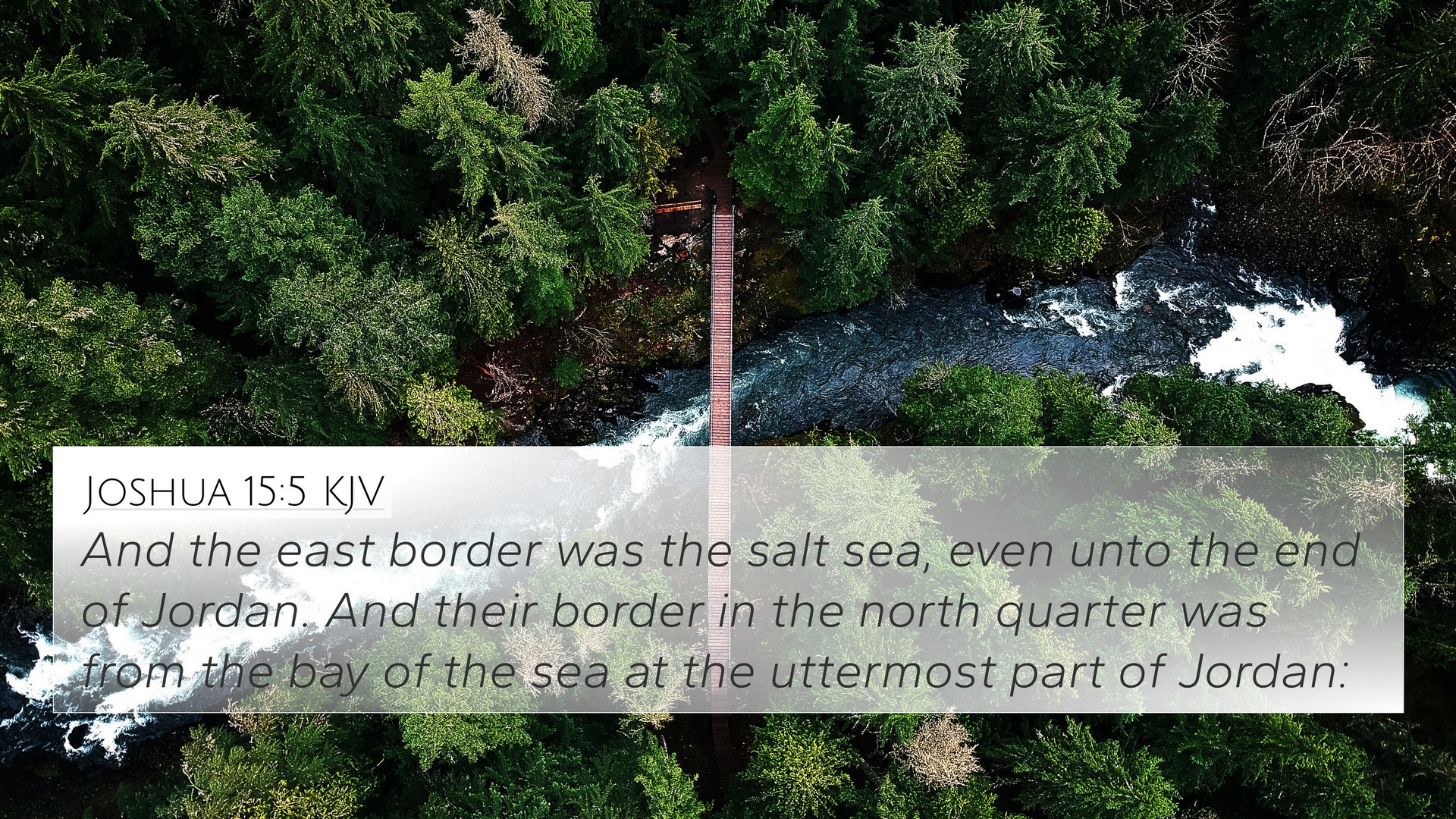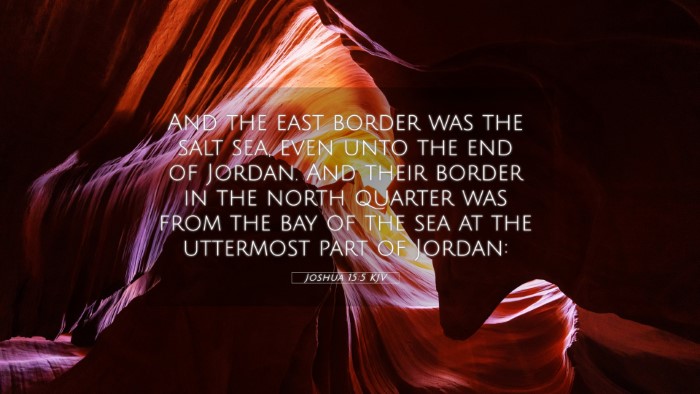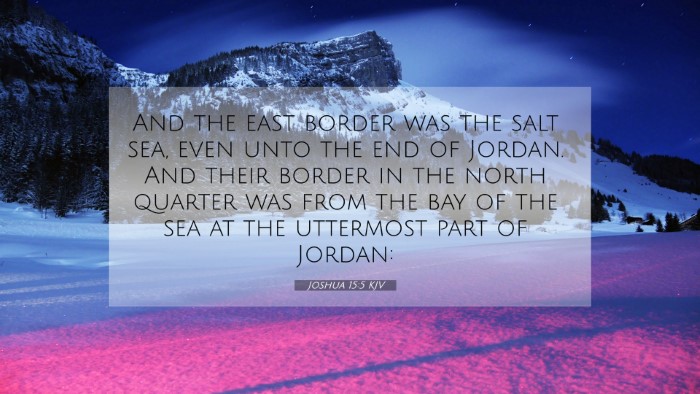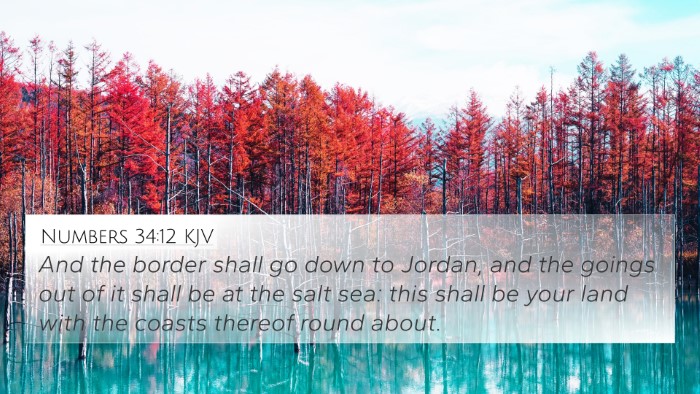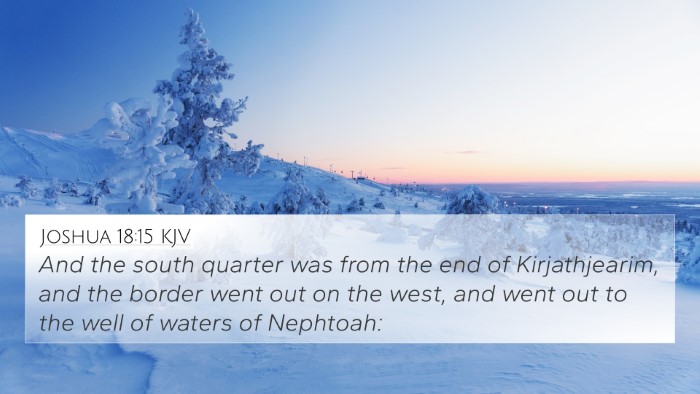Understanding Joshua 15:5 - A Comprehensive Analysis
Verse: Joshua 15:5 - "And the east border was the salt sea, even unto the end of Jordan: and the border in the north quarter was from the bay of the sea at the uttermost part of Jordan."
Contextual Meaning
The verse is a part of the larger narrative concerning the allocation of the Promised Land among the tribes of Israel. Joshua, as the leader, meticulously describes the borders of the land assigned to the tribe of Judah. This verse highlights the geographical boundaries, setting a foundation for understanding the land's division.
Commentary Insights
Matthew Henry's Commentary
Matthew Henry emphasizes that the description of the borders is not merely a geographical record but symbolizes God's faithfulness in providing land to His people. The "salt sea" represents both the end of the land and God's covenant promises. The specific mention of geographical features serves to underline the importance of the inheritance given to Judah.
Albert Barnes' Commentary
Albert Barnes elaborates on the significance of the east border being the Salt Sea, which is understood as a marker of the wasteland and desolation that Israel was to avoid. He links this to the historical journey and the promise of fruitful lands that beckoned beyond the desert. The geographical precision serves as a reminder of God's meticulous plan for his people's inheritance.
Adam Clarke's Commentary
Adam Clarke points out the cultural and theological implications of land boundaries. The mention of the Salt Sea and the Jordan signifies more than just physical borders; it reflects the spiritual journey towards fulfillment of God's promises. Clarke discusses how this verse can be viewed through the lens of divine providence as God guides His people to their inheritance.
Thematic Connections
Joshua 15:5 connects with several broader Biblical themes, including:
- The Importance of Land: Land as a covenantal promise (Genesis 12:7)
- God's Guidance: God’s leading through the wilderness (Exodus 13:21-22)
- Faithfulness of God: Reminders of God's promises through land distribution (Psalm 105:44-45)
- The Role of Leaders: Joshua as a faithful leader (Deuteronomy 31:7-8)
- Judah's Significance: The tribe of Judah's prominence (Genesis 49:10)
Cross-Referencing Biblical Texts
Cross-referencing this verse can help illuminate deeper meanings and connections. Here are significant Bible verses that relate to Joshua 15:5:
- Genesis 13:14-15 - God's promise to Abraham regarding the land.
- Numbers 34:3-12 - Description of the borders of Canaan.
- Deuteronomy 3:17 - Mention of the Jordan River and the eastern territories.
- 2 Samuel 24:5 - The significance of land in Israel's history.
- Matthew 4:18-22 - Jesus' ministry begins near the same geographic location.
- Hebrews 11:9-10 - Faith in the promised land as inheritance.
- Revelation 21:1-2 - Ultimate fulfillment of God's promises with a new heaven and earth.
Applying Cross-Reference Tools
To enhance understanding of Joshua 15:5, utilizing tools for Bible cross-referencing can be beneficial. Here are some ways you can delve deeper:
- Use a Bible Concordance to explore related terms and themes.
- Explore a Cross-reference Bible Study Guide for detailed narratives.
- Implement Bible reference resources to track down connections between verses.
Conclusion
Joshua 15:5 serves as both a geographical marker and a theological reminder of God's steadfast promises to His people. Through the insights gathered from reputable commentaries and cross-references, we find a tapestry woven with divine purpose, historical significance, and future hope. Engaging in a comparative study of this verse alongside others enhances our understanding of Biblical themes and deepens our spiritual insight.
